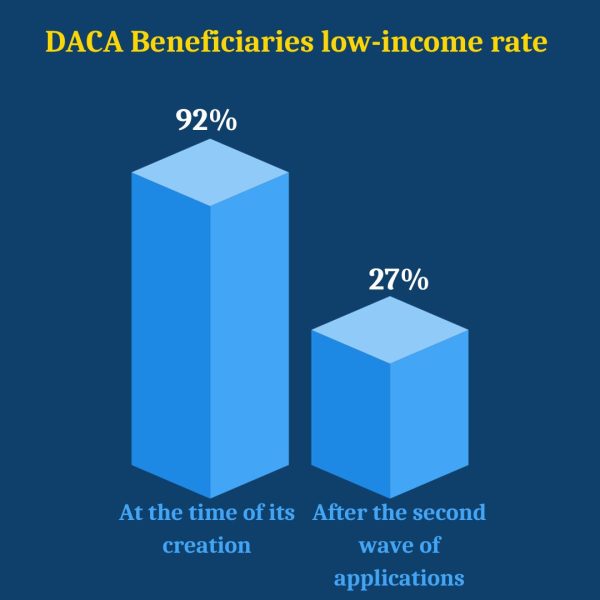Since the start of the Deferred Action for Childhood Arrivals (DACA) in 2012 by the Obama Administration, many young, undocumented immigrants saw a relief in their future by having their stay in the United States secured for two years, while also being allowed to work and study in the country. However, the recent rejection of the program by Federal Judge Andrew S. Hanen from the Southern District of Texas keeps proving that this program needs to be replaced or improved to truly help immigrants pursue stability and happiness in America.
The Department of Homeland Security (DHS) states that around 800,000 teenagers and young adults have benefited from this program, which defers all legal action on undocumented immigrants inside the United States for two years. The program also has allowed beneficiaries to apply for work authorization. What many fail to realize is that no legal status, nor a pathway to it, is offered by DACA. It instead serves as a temporary relief until you are able to process documentation.
Since former President Donald Trump’s previous attempts to terminate the program in 2017, beneficiaries of DACA have been paying close attention to all new rulings released by the DHS that could have a strong positive or negative impact on their future status.
While the Supreme Court reinstated DACA back in 2020, as they claimed Trump’s administration did not follow the right procedures on the termination, they left a door open for another ruling on DACA to happen in the future. If future parties were to follow the right procedure on its termination, and if the court was opposed to the legality of DACA, the program could be terminated and thousands would be left without lawful immigration status.
We have to keep in mind that many of the beneficiaries who were, on average, 21-years-old at the time of DACA’s initiation, are now around the age of 32. Many of them have grown families of their own here and now have children or have a family back in their country of origin who they work to provide for. With a working authorization issued, all beneficiaries who work are also paying federal and state taxes.
Harvard professor Roberto Gonzales mentioned in an article published for the Harvard Gazette that DACA was a strong stress reliever for those beneficiaries first entering the program. “It was made very clear to me the strong link between undocumented status and strained well-being. With DACA, our respondents were reporting reduced stress in their daily lives and less fear of authorities,” said Gonzales.
In the academic journal “The Limits of Gaining Rights While Being Marginalized” written by three sociology professors from UC Davis, it is inferred that the ever changing status of DACA has only increased stress among the people living here through this program.
Data from this has shown that during the time of DACA’s founding, only 16% of applicants had “increased stress, nervousness, or anxiety, due to legal status.” However, after Trump’s promise to get rid of DACA, of the second wave of applicants in 2018, 62% were found to have been under stress due to their legal status with DACA. This is almost four times higher than the initial wave of applicants.
Another statistic shows how DACA has actually helped its beneficiaries out of low-income status with 92% having a low income before its creation. After the first two waves of the program’s applications, only 27% of beneficiaries are still in the low-income status bracket.

Our government, while seeing the good and bad factors of this program, still has yet to take proper action to help these people out from the legal tightrope they have been forced to walk by living on dependency to DACA.
One year had passed from the reinstatement of the program before Federal Judge Hanen, appointed by former President George W. Bush in 2002, declared it unlawful and extended it to the DHS final ruling of DACA that was released and placed into effect in October 2022. The ruling allows the 600,000 beneficiaries to stay in the program but closes the door for any new applicants.
In a situation like this, our government can and should develop a more solid alternative that could protect the people that live under DACA’s benefits today and the people that do not pass the numerous requirements for this program that offers them all a proper path to documentation in the United States.
National correspondent Miriam Jordan wrote for The New York Times explaining that, “National polls have repeatedly found that Americans across the political spectrum favor granting Dreamers legal status. But a legislative solution never materialized…”
If the Biden Administration wants to help DACA recipients and illegal immigrants alike, they need to start either reforming the program or finding other solutions to help them. Instead of giving them two years of legal status that could change at any minute by the instability of the program, this administration needs to start putting in the legal work to create a foundation for immigrants to thrive in this country. They need to create this without it having the possibility of crumbling in an instant.
The people in power need to take a long, hard look at what they deem important. If they find family important, why take away the opportunity for immigrants with families that have been created in the U.S. to live their lives under the freedom and opportunities that America gives them? Why keep the door open that instills fear amongst the many who are fighting to obtain legal status?
The United States of America was built on the backs of immigrants. They needed a haven that could provide for them in many ways. They created what the U.S.A. is today. While it is true that the Obama Administration “had not fulfilled a mandatory public notice-and-comment period” as stated by Hanen, what’s the real issue here? Immigrants trying to obtain legal status legally or DACA giving hope to illegal immigrants that they can finally stay in this country without living in fear?



